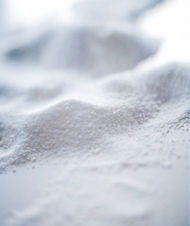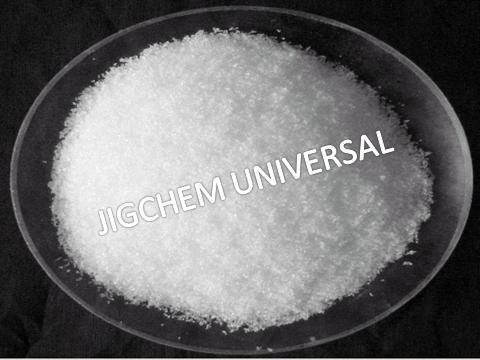L Tryptophan
MOQ : 25 Kilograms
L Tryptophan Specification
- Shelf Life
- 24 Months
- Loss on Drying
- 0.2% max
- Particle Size
- 100 Mesh
- Solubility
- Slightly soluble in water
- HS Code
- 29224990
- Heavy Metal (%)
- 0.001% max
- Structural Formula
- C11H12N2O2
- Molecular Weight
- 204.23 g/mol
- Taste
- Slightly Bitter
- Color
- White
- Melting Point
- 289C (dec.)
- Molecular Formula
- C11H12N2O2
- Storage
- Store in a cool, dry place away from sunlight
- Smell
- Odorless
- Poisonous
- NO
- Type
- Amino Acid
- Grade
- Pharmaceutical Grade
- Purity(%)
- 98% min
- Physical Form
- Solid
- Arsenic (As)
- 0.0001% max
- Chloride (Cl)
- 0.05% max
- Ash Content
- 0.1% max
- Iron (Fe)
- 0.003% max
- Sulphate (SO4)
- 0.03% max
- Lead (Pb)
- 0.0005% max
- Specific Optical Rotation
- +19.5° to +21.5° (C=2, 6N HCl)
- Microbial Limits
- Total Plate Count <1000cfu/g, Yeast & Mold <100cfu/g, E. Coli & Salmonella: Negative
L Tryptophan Trade Information
- Minimum Order Quantity
- 25 Kilograms
- Supply Ability
- 25 Kilograms Per Day
- Delivery Time
- 1-3 Days
About L Tryptophan
L Tryptophan, a world-class amino acid, is highly recommended for diverse pharmaceutical applications owing to its monumental purity (98% min) and exceptional safety profile. This top-grade product features reduced impurity levelschloride, sulphate, iron, arsenic, and leadcomplying with strict microbial limits for maximum quality. The highly pure, white, odorless solid is perfect for advanced formulations, ensuring reliable results. With a competitive reduced price, L Tryptophan offers 24 months of assured shelf life. Sourced in India, it is suitable for distributors, exporters, importers, manufacturers, suppliers, traders, and wholesalers seeking exceptional performance.
L Tryptophan: Site of Application & Commercial Uses
L Tryptophan is extensively utilized in pharmaceutical manufacturing, nutritional supplements, and food fortification. Its exceptional purity makes it ideal for specific applications in antidepressant, sleep-enhancing, and mood-stabilizing formulas. Commonly used in research laboratories and health product formulations, L Tryptophan supports protein synthesis, neurological function, and various metabolic pathways. Its unique profile and stability encourage widespread use across pharmaceutical, nutraceutical, and related industries, ensuring innumerable benefits to end-users and commercial stakeholders alike.
L Tryptophan: FOB Port, Supply & Delivery
Shipment for L Tryptophan is efficiently managed from major Indian FOB ports, ensuring timely handover to global clients. With robust supply ability, bulk orders and consistent deliveries are seamlessly processed, guaranteeing order completion within specified lead times. Our streamlined logistics and reliable distribution network reduce delays and facilitate prompt dispatches, catering to wholesalers, exporters, and local markets alike. Orders are executed with precision, offering buyers peace of mind and exceptional customer satisfaction throughout the supply chain.
L Tryptophan: Site of Application & Commercial Uses
L Tryptophan is extensively utilized in pharmaceutical manufacturing, nutritional supplements, and food fortification. Its exceptional purity makes it ideal for specific applications in antidepressant, sleep-enhancing, and mood-stabilizing formulas. Commonly used in research laboratories and health product formulations, L Tryptophan supports protein synthesis, neurological function, and various metabolic pathways. Its unique profile and stability encourage widespread use across pharmaceutical, nutraceutical, and related industries, ensuring innumerable benefits to end-users and commercial stakeholders alike.
L Tryptophan: FOB Port, Supply & Delivery
Shipment for L Tryptophan is efficiently managed from major Indian FOB ports, ensuring timely handover to global clients. With robust supply ability, bulk orders and consistent deliveries are seamlessly processed, guaranteeing order completion within specified lead times. Our streamlined logistics and reliable distribution network reduce delays and facilitate prompt dispatches, catering to wholesalers, exporters, and local markets alike. Orders are executed with precision, offering buyers peace of mind and exceptional customer satisfaction throughout the supply chain.
FAQs of L Tryptophan:
Q: How should L Tryptophan be stored to maintain its quality?
A: L Tryptophan should be stored in a cool, dry place away from sunlight, ensuring the product retains its exceptional purity and efficacy throughout its 24-month shelf life.Q: What are the main commercial uses of L Tryptophan?
A: L Tryptophan is primarily used in pharmaceuticals, nutritional supplements, and food fortification due to its high purity, making it suitable for antidepressant, sleep aid, and mood-enhancing formulations.Q: What is the process for ordering and receiving L Tryptophan shipments?
A: Orders are confirmed and processed promptly, with shipment handled through prominent Indian FOB ports. Delivery times are agreed upon during order confirmation, ensuring efficient handover and order completion.Q: Where is L Tryptophan manufactured and supplied from?
A: L Tryptophan is manufactured and sourced in India, distributed by reliable exporters, suppliers, and wholesalers to national and international markets.Q: How is the purity and safety of L Tryptophan ensured?
A: The product undergoes stringent quality control to meet pharmaceutical grade standards, maintaining purity at 98% minimum, with reduced levels of chloride, iron, lead, and low microbial counts.Q: What are the benefits of using pharmaceutical-grade L Tryptophan?
A: Using pharmaceutical-grade L Tryptophan provides ensured safety, traceability, and efficacy, making it a top choice for health supplements and advanced drug formulations.
Tell us about your requirement

Price:
Quantity
Select Unit
- 50
- 100
- 200
- 250
- 500
- 1000+
Additional detail
Mobile number
Email
More Products in Pharmaceuticals API Category
CLOBETASOLE PROPIONATE USP
Price 20 INR
Minimum Order Quantity : 25 Kilograms
Usage : Laboratory Industrial Use
Storage : Dry Place
Chemical Name : CLOBETASOLE PROPIONATE USP
Purity(%) : 98 %
Mirtazapine IP
Price 20 INR
Minimum Order Quantity : 25 Kilograms
Usage : Laboratory Industrial Use
Storage : Dry Place
Chemical Name : Mirtazapine IP
Purity(%) : 96 %
Mefenamic Acid IP
Price 20 INR
Minimum Order Quantity : 25 Kilograms
Usage : Laboratory Industrial Use
Storage : Dry Place
Chemical Name : Mefenamic Acid IP
Purity(%) : 96 %

 Send Inquiry
Send Inquiry






 Send Inquiry
Send Inquiry Send SMS
Send SMS